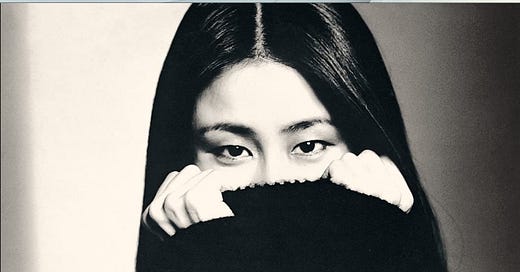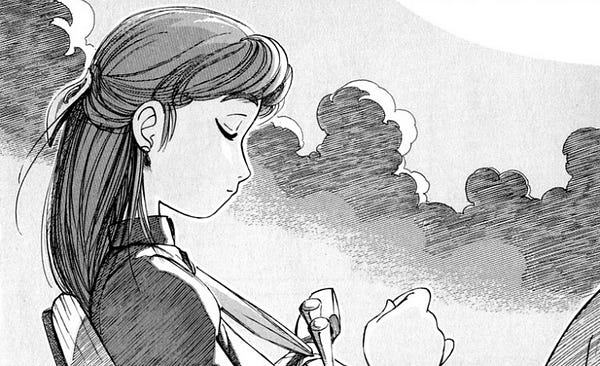Make Believe Mailer 32: Learning To Let Go
Taeko Onuki, Jun Togawa, Toei Animation And Releasing Your Grip
I recently wrote a story for Japanese website Newspicks about a string of recent viral TikTok trends featuring Japanese music, and what Japanese entertainment can take from it. It’s all in Japanese…but for this week’s essay I wanted to share the English version, with a little extra added in.
Taeko Onuki has enjoyed newfound attention outside of Japan in recent years. As internet users all over the world stumbled across “city pop” in the early part of the 2010s, the singer-songwriter’s work recieved a lift courtesy of online curators and the ever-helpful YouTube algorithm. Interest abroad in her 1977 sophomore album Sunshower even ended up the topic of a much-discussed segment on the popular You Wa Nani Shi Ni Nippon He? TV show, wherein a camera crew asks fresh-off-the-plane visitors at airports in the country why they’ve come.
She didn’t really breakthrough to a wider global audience until content creators started getting down on their knees to her music. “Lord, give me one last chance!” goes a chorus of voices in the chorus of Onuki’s 1978 song “4:00 a.m.,” from her third album Mignonne. Despite being arranged by celebrated artist Ryuichi Sakamoto, the song has long been a deep cut, having never been released as a single.
That’s until recent months, when TikTokers around the world latched onto the hook of the Onuki song, either by dropping to the floor, showing off makeup, wrestling with personal trauma or celebrating anime.
It’s a familiar story — a random song, sometimes new and sometimes decades old, suddenly goes viral on the short-form video platform. Maybe there’s a dance challenge, or prompt that’s easy to replicate (see Miki Matsubara’s 1979 debut single and pivotal TikTok hit “Mayonaka No Door ~ Stay With Me~”). Oftentimes, the song just emerges in the short-form platform’s ecosystem, and users do with it what they want.
What remains somewhat new — the digital success decades-old songs can suddenly experience off of TikTok discovery. Onuki’s “4:00 a.m.” broke into multiple Viral Top 50 charts on Spotify, including country-specific charts for The United States, Russia, Ukraine, Poland, Canada and more, alongside the Global edition of the chart. In many of these nations, it spent time in the top ten (at time of writing, it sits at #32 globally).
For Onuki — an artist who has never flirted with international stardom — this constitutes a breakout moment, however it happened.
~~~ NEW PARAGRAPH FOR SUBSCRIBERS! ~~~
A minor irony to “4:00 a.m.” becoming a streaming hit is Onuki herself isn’t really a fan of the album it comes from. I had the chance to interview her for Red Bull Music Academy a few years back, and the topic of Mignonne came up midway through.
I worked with a producer on that album [Eji Ogura, a music critic who had come down hard on Onuki’s previous albums], and during the recording all sorts of things were changed. I ended up feeling sick of the process. Part of that was because I changed record labels [from Panam to RCA], and they really wanted to sell this album. Before I could do whatever I wanted to do. But with Mignonne, the producer wanted to change things. That was new for me.
I felt bad for the fans. Even though I had only put out two albums by then, I had been free to do what I wanted. I was building up momentum. But then I was just doing something for sales, and I didn’t want to release Mignonne. But we did, and the sales actually weren’t that good. Then I felt like, “I can’t do this anymore.” I wanted to get out of the music industry.
She took a two year break from music after that, before finding a new producer to work with (I guess don’t work with music critics, especially the ones that slam your previous albums!), shifting towards a new, European-indebted approach to music that blossomed in the ‘80s.
~~~ RETURN TO NEWSPICKS ORIGINAL ~~~
TikTok as digital hit making platform isn’t a new phenomenon, and the case of Onuki’s sudden virality is just the latest reminder of how pop culture — including Japanese exports, accidental or intentional — move in the world today. The more valuable lesson for Japanese companies to learn from it as 2022 starts is that this is the reality for everything today.
Trying to pinpoint exactly how “4:00 a.m.” became a social media hit is near impossible, but the timeline of how it went viral is easier to figure out. YouTube user TheAmuseum shared the song to the site in 2014, and their upload has become the ground-zero for discovery of the song. As “city pop” began enjoying newfound interest online, “4:00 a.m.” received an algorithm-boosted assist similar to Mariya Takeuchi’s “Plastic Love,” albeit not at the level of internet ubiquity that one enjoyed…at least at first. Dig through the comments under the clip and you’ll find plenty of gobsmacked users wowed by the song’s desperate cries…unaware it ever existed before it appeared in their recommended list.
What took it…and many other left-field hits out of Japan from the last few years…was suddenly being present places where people go to find music. A couple years ago, the majority of Onuki’s catalog ended up on subscription streaming and could also be used on TikTok. Potential listeners had new ways of discovering her (you can find Reddit users referencing Spotify putting it in front of them a year before it really got huge on TikTok), and then making it their own. That could be a bass cover, Neon Genesis Evangelion tribute video or even just inspiration for a melancholic drawing. A few years prior, whoever makes the decision to share her music online might have bristled at having to give up control of how people come to her catalog. Today, that’s key to producing a hit on any level — people want to be involved in how it is interpreted and spread.
Concurrent TikTok hits only underline this more. Japanese funk band Ali and rapper AKLO’s “Lost In Paradise” actually had some advantages to going vital when it came out in 2020 — it served as the opening theme to the popular anime series Jujutsu Kaisen, and received an extra bump by being the walk-up music for eventual MLB American League MVP Shohei Ohtani. This made it a natural viral hit, inspiring cosplay videos and dance numbers among thousands more. Then Ali’s drummer was arrested for fraud, and the band quickly went on hiatus…and pulled the song from streaming and the video from YouTube. While it eventually returned this fall to much rejoicing, that time off services hurt its standing…and left a widespread longing for a way they could enjoy it again.
An even more surprising — and gorey — example comes from the always unnerving pop act Jun Togawa. Her 1985 song “Suki Suki Daisuki” has long been popular with overseas fans of Japanese music, but it enjoyed new life this year. Starting off initially as the backing music for a popular South Korean animated short, it mutated into a NSFW TikTok trend riffing on another Korean webtoon (and eventually turning into a more general “spooky” Halloween meme), wherein the creator goes to brush their teeth (or do something else), except they accidentally use a razor blade (or some other dangerous item) and suddenly find blood spilling out of their mouth (or victims of some accident of varying degrees of severity). Again, the creators themselves played an active role…but it was essential that the song was available to them, and that Alfa Records uploaded the official video to receive extra attention and offer more context.
Japanese entertainment companies were, for a longtime, hesitant to embrace the internet and allow their total control of how media was experienced and interacted with to weaken. Many remain skeptical, and they are losing out globally. It can result in missed opportunities — say, an artist’s music not being online and thus missing out on the chance to spread organically — or outright hostility.
Recently, Toei Animation filed copyright claims against 150 videos on popular anime YouTuber Totally Not Mark’s channel, erasing his work. He posted an emotional response (now deleted, but can be seen via reaction clips) that went viral…and now many online are furious at Toei for their actions, some going as far as to declare that they won’t engage with their titles anymore. Regardless of whether they act on that or not, the hit to the company’s reputation internationally…especially amongst fans…is massive.
The reality is, if one’s entertainment output wants to be embraed on the global stage, it has to be accessible. Fans, after all, are the ones who will hit on a way for something to grow into something viral online, whether it’s a contemporary anime theme or a 40-year-old-plus song perfect for dramatically dropping to your knees to.
Bonus Photo Of Taeko Onuki With A Penguin
Written by Patrick St. Michel (patrickstmichel@gmail.com), published in Japanese on Newspicks
Twitter — @mbmelodies








